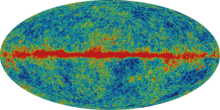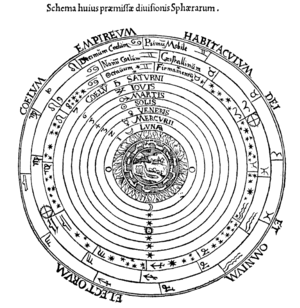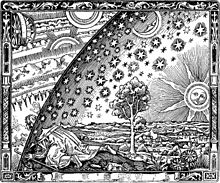- Cosmos
-
In the general sense, a cosmos is an orderly or harmonious system. It originates from the Greek term κόσμος (kosmos), meaning "order" or "ornament"[1] and is antithetical to the concept of chaos. Today, the word is generally used as a synonym of the word Universe (considered in its orderly aspect). The word cosmos originates from the same root. In many Slavic languages such as Russian and Bulgarian, the word Космос cosmos means also the "outer space". In Mandarin Chinese, cosmos is translated as 宇宙 yuzhou, which literally translated means space-time (宇 yu = space + 宙 zhou = time).
Contents
Philosophy
Pythagoras is said to have been the first philosopher to apply the term cosmos to the Universe, perhaps referring to the starry firmament.
Russian cosmism is a cosmocentric philosophical and cultural movement that emerged in Russia in the early 20th century.
Cosmicism is a philosophical position that mankind is an insignificant aspect of a universe at best indifferent and perhaps hostile. This philosophy, explored by writers such as H.P. Lovecraft (who some say is the original proponent of the philosophy) and later writers who actually represented the beliefs in books such as Hitchhiker's Guide to the Galaxy.
Theology
In theology, the term can be used to denote the created Universe, not including the creator. The Septuagint uses both kosmos and oikumene for the inhabited world.[citation needed] In Christian theology, the word was also used synonymously with aion to refer to "worldly life" or "this world" as opposed to the afterlife.
The cosmos as originated by Pythagoras is parallel to the Zoroastrian term aša, the concept of a divine order, or divinely ordered creation.
Olaf Stapledon, in his science fiction novel Star Maker (1937), describes how God (the Star Maker) evolves by creating ever more complex cosmoses across multicosmic hypertime.
Cosmology
Cosmology is the study of the cosmos in several of the above meanings, depending on context. All cosmologies have in common an attempt to understand the implicit order within the whole of being. In this way, most religions and philosophical systems have a cosmology.
 Image of distribution of the cosmic microwave background radiation 700,000 years after the Big Bang, generally assumed to have occurred about 13,700,000,000 years ago.
Image of distribution of the cosmic microwave background radiation 700,000 years after the Big Bang, generally assumed to have occurred about 13,700,000,000 years ago.
In physical cosmology, the term cosmos is often used in a technical way, referring to a particular space-time continuum within the (postulated) multiverse. Our particular cosmos is generally capitalized as the Cosmos.
Integral Philosophy
The philosopher Ken Wilber uses the term kosmos to refer to all of manifest existence, including various realms of consciousness. The term kosmos so used distinguishes a nondual Universe (which, in his view, includes both noetic and physical aspects) from the strictly physical Universe that is the concern of the traditional sciences. Wilber's nephew (Cosmo Iacavazzi, fullback at Princeton University) is said to have been named after the scientific term.
Ancient Greek conception of the cosmos
The Ancient Greek natural philosopher Archimedes in his essay The Sand Reckoner, estimated the diameter of the cosmos to be the equivalent in stadia of what we call two light years.
Age and size of the cosmos
According to current scientific theory, the cosmos began 13.7 billion years ago short scale in the Big Bang. The current diameter of the observable cosmos is thought to be about 93 billion light years.
The diameter of the entire cosmos is unknown. However, according to Alan Guth's inflation theory, the actual size of the cosmos is at least fifteen orders of magnitude larger than the observable universe. This means that if the inflation theory is correct, the 93 billion light year diameter of the observable universe is approximately as much smaller than the diameter of the entire universe as the diameter of a helium atom is compared to the diameter of the Sun. This is equivalent to a minimum diameter of the entire cosmos of 1026 light years (100 septillion light years short scale).
See also
- Anthropic principle
- Astronomy
- Cosmic Logos
- Cosmic View
- Cosmic Zoom
- Cosmology
- Cosmogram
- Cosmography
- Cosmos: A Personal Voyage (Carl Sagan's television documentary series)
- Fate of the universe
- Lambda-CDM model
- Large scale structure of the cosmos
- Macrocosm and microcosm
- Megaverse
- Multiverse
- Observable universe
- Omega point (de Chardin)
- Omega point (Tipler)
- Omniverse
- Timeline of the Big Bang
References
- ^ κόσμος, Henry George Liddell, Robert Scott, A Greek-English Lexicon, on Perseus
External links
- Cosmos – an Illustrated Dimensional Journey from microcosmos to macrocosmos – from Digital Nature Agency
- JPL Spitzer telescope photos of macrocosmos
- Macrocosm and Microcosm, in Dictionary of the History of Ideas
- Encyclopedia of Cosmos
- merriam-webster.com/dictionary/cosmic
Categories:- Metaphysics
- Cosmology
- Greek loanwords
- Neoplatonism
Wikimedia Foundation. 2010.



